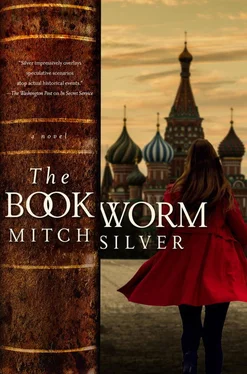“Anthony, let me get down to cases. As part of the war effort, I wish to engage a person such as yourself to create a seemingly ancient document, a ruse that must have impeccable bona fides.”
“Are you with one of the services?”
I had practiced my response. “Yes, a rather secret one, I’m afraid.”
Blunt smiled for the first time and finished his drink. “Oh, don’t be afraid. I love secrets.” He held out his empty glass to the waiter, an old gaffer who had been hovering nearby. “Another of the same,” he said.
I waited until Blunt’s eyes were back on me. “We require a man of your resources to help devise a medieval forgery.”
“A simulacrum.”
“Beg pardon?” I wasn’t sure what Blunt had said.
“You want me to create a simulacrum, I hope, and not a forgery. Something that appears genuine in all respects but isn’t, as opposed to a faked version of something that actually exists. I don’t do fakes.”
I don’t mind admitting that it seemed a distinction without a difference. “A simulacrum then, if I’m pronouncing it right.”
“You are. And I will. If the compensation is appropriate.”
“How much do you require?”
“Oh, there will be expenses, to be sure. But I don’t expect coin of the realm.”
“Then what—”
“I wish to be taken into your service. To enlist… in the war effort.”
I suppose now is the time to declare, for the record, that I had absolutely no knowledge Anthony was already working for the Soviets. That, in fact, he had been doing so ever since his Cambridge days.
Your young Nigel here has put me “in the picture” as regards Anthony’s frequent rendezvous with Ivan Stoichkov, their sinister London Head of Station. Robert, you have specifically asked me who first broached the subject of his joining the Service. I now state, unequivocally, he did.
As I wasn’t a talent spotter, I made no reply at the time. Or rather, I tucked into my leg of lamb, which another of the farm-boys-turned-carvers—this one with ginger hair—had just put on my plate. Anthony’s gaze was riveted just above another leg, on the boy. The conversation was, for the moment, over.
Afterward, I redeemed from the cloakroom the Hamley’s shopping bag I’d got when I bought some electric trains for my nephews. In it was the material my man Lawrence had assembled on Nostradamus, as well as Kennedy’s little book of prophecies. I handed it to Blunt, who gave it a jaundiced eye and promised to “look at it over the weekend.”
Oh, hold on, Nigel is tapping on the glass. I… I’m wanted on the telephone. I see there’s more room on the cylinder, so we’ll pick this up again in a few moments.
Chapter 18

Time for a little fact checking, Lara told herself. First step: learn if there was any truth at all to Noël Coward’s story—Coward, the playwright and songsmith, but definitely not the historian.
Taking off the headphones, Lara scrolled back through her iPad notes of the man’s testimony and started with “Sir Robert.” No last name, so there was no help there. Moving on to In Which We Serve , she dragged the phrase over to the Google search box. What came back was, “The 1942 film boasts an impressive cast, which includes Noël Coward, John Mills and Celia Johnson.”
She then typed in “Celia Johnson.” Google showed her the woman’s obituary: “Celia Elizabeth Johnson. A fine actress and beloved mother; wife of Peter Fleming. Born December 18…” All right, Ian Fleming did have a sister-in-law named Celia who was an actress alongside Coward.
Next, Lara determined the old RMS Aquitania had indeed crossed and recrossed the Atlantic during the war, first as a passenger liner and later as a troop ship, before finally being sent to the scrapyard in 1950. So, that part of his tale, about cabling his assistant from the ship, was plausible.
While she was considering what to do next, her phone vibrated soundlessly. Outgoing calls were discouraged in the Arkhiv. Incoming ones were absolutely prohibited unless one’s mobile had the ringer off. It was her tenant, Katrina.
“Trina?”
Lara could hear the buzz of the busy TsUM department store in the background. “Larissa Mendelova, I’m sorry, I know it’s Tuesday and I’m supposed to pick up dinner, but something’s come up. Maxim is taking me to the Lokomotiv football match.”
“Who’s Maxim?”
“You met him last night. He was the tall one, the soldier. We’re going straight from work, so I’m afraid you’ll have to do your own shopping. I’d do it myself on my lunch hour, but I have an errand to run and—”
“Don’t worry about it. I’ll be getting home late myself.”
“A date?”
“Not exactly. I—”
“Good for you, Lara. Oh, I almost forgot. Viktor called again.”
“What did he want?”
“I’m not sure, something about the divorce papers. He said you know the number.”
Lara sighed. More stalling tactics. “I know the number.”
“Look, I’ve got a customer.”
“Okay, see you… whenever.”
“Umm, don’t wait up, you know?”
Lara sighed again. “I know.”
Noël Coward began clearing his throat and she turned back to her work.
I apologise for that telephone call just now. It was another call, from Blunt a few days after we’d met, that brought me to the Courtauld Institute of Art at 20 Portman Square, a Georgian home I believe was once the official residence of the French Ambassador to the Court of St. James. A century and a half later, he would be chagrined to know it’s populated by art students.
Fearing that German artillery and the Luftwaffe’s dive bombers would begin their “rain of terror” any day now, the faculty—many of them German-Jewish refugees from Hamburg’s Warburg Library—and the entire student body were engaged in taking down the artworks from the walls and packing them for removal to the safety of the countryside.
In his “Technological Department,” the art restoration workshop one storey down from his own top-floor digs, Blunt insisted on giving me “the shilling tour.” There must have been a hundred different varieties of the canvas, board, paper, and parchment used by artists through the millennia. And untold numbers of paints, inks, varnishes, and shellacs, side by side with the pens and brushes of every size, shape and material needed to apply them. Blunt called it “my playroom, which doubles as the best-equipped art supply shop in the world.”
As my own Technology Department consists of a pen-and-pencil set, I was suitably impressed, and I told him so. “When I said at lunch we needed a man of your resources, I had no idea how… resourceful your resources were.”
“Thank you, Noël—” Blunt was interrupted by two students, a young man and a woman, carrying a Van Gogh self-portrait, the one with the bandaged ear, down from his rooms for safekeeping. He said, wistfully, “I’m going to miss the crazy old boy.” It would be the only vaguely sentimental moment I would ever see the man have.
We followed the students carrying the picture down the wide central staircase. As best I can remember, I tried to ease into the topic of his ”payment.” “Yesterday I telephoned someone I know in the Government and, if we can pull this thing off, there might be a place.”
He said, “This ‘thing’ of yours, this simulacrum—who knows about it?”
“In this country? No one.”
“You mean no Grand Poobah has vetted your idea?”
Читать дальше













